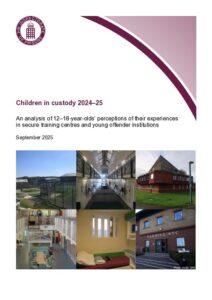Children in custody 2024–25
An analysis of 12–18-year-olds’ perceptions of their experiences in secure training centres and young offender institutions.
What we found (Back to top)
Although the number of children held in YOIs and Oakhill STC had decreased since the last annual review, outcomes had not improved, despite improved child-to-staff ratios. Appalling findings at Cookham Wood in 2023 had led to its closure as a YOI in 2024, but this merely meant that children were moved to other struggling establishments.
Violence was rife, with 43% saying they had felt unsafe at some point and 61% experiencing some form of bullying, violence or victimisation from other children, yet shockingly only 27% saying they would report this victimisation. In the absence of effective behaviour management schemes, staff resorted to keeping children apart from each other or separating them completely, and some children stayed in their cells because they were scared. This limited their ability to get to activities, with 39% at Feltham A saying they were not engaged in any education, work or training. Even when children did make it to activities, the quality of provision was frequently poor.
These files may not be suitable for users of assistive technology.
Request an accessible format
If you use assistive technology (such as a screen reader) and need a version of any of these documents in a more accessible format, please email media@hmiprisons.gov.uk. Please tell us what format you need. It will help us if you say what assistive technology you use.


